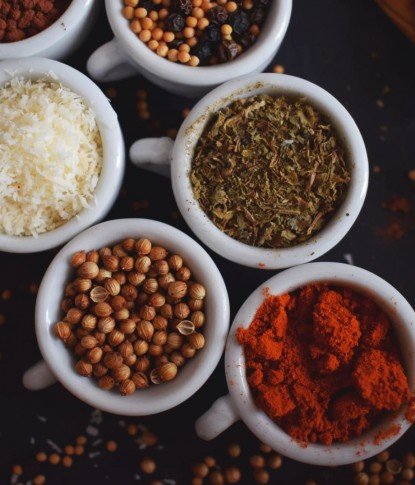
Say goodbye to breakouts and hello to clearer, calmer skin.
Acne doesn’t just affect teenagers. Whether it’s the odd breakout or persistent skin flare-ups, acne can hit at any age, and it doesn’t just leave a mark on your face. It affects confidence, stress levels, and even how we show up at work or in social situations.
Want to know the best vitamins to take for your skin? Take our free consultation to find out.
The good news? Targeted vitamins and nutrients can help support clearer skin from the inside out. At Everly, we’re all about finding what your body needs, not what TikTok trends tell you to buy. So if you’re dealing with acne and wondering where to start, here’s what to know.
What causes acne?
Acne is a complex condition triggered by a mix of hormones, inflammation, diet, stress, and even gut health. You might notice it gets worse during stressful weeks, around your period, or in winter months when your vitamin D levels are lower.
That’s why there’s no one-size-fits-all solution. Instead, getting to the root cause is key, and that’s exactly what our Everly Powerpack quiz is designed to do.
The top vitamins & nutrients that may help with acne
Here’s what the science says about the most effective skin-supporting supplements:
- Vitamin A – A powerful antioxidant that helps reduce inflammation and support skin cell turnover. Ithas also been shown to regulate the skin’s oil production, helping toprevent clogged pores. Vitamin A is an antioxidant that can help neutralise the free radicals that can damage your skin[2]. It helps condition the skin and with the healing of outbreaks.
- Probiotics – Good bacteria in the digestive system help ensure a healthy gut lining which can lower inflammation in the body. The health of the skin is often a reflection of how healthy the gut is. Taking probiotics can boost immunity and lower inflammation in the body[3].
- Zinc – Research says that people with acne tend to be deficient in zinc. Zinc has antibacterial and anti-inflammatory properties that may be beneficial in reducing acne[4]. Vegetarian and vegan diets can be low in zinc.
- Omega-3 fatty acids – Omega-3 fatty acids contain EPA and DHA. EPA has anti-inflammatory properties and has been shown to sooth the inflammatory response associated with acne. It also helps regulate the hormone testosterone which triggers the over production of sebum, which can raise the risk of skin infections and outbreaks[5].
- Vitamin E – Vitamin E has antioxidant and anti-inflammatory properties. Vitamin E helps optimise the immune system and helps with cell regeneration[6].
- Vitamin D – Vitamin D plays an important role in the immune system. It helps modulate the immune system and can help reduce inflammation in the skin. Research has found that sufferers of acne can be deficient in vitamin D[7].
Since Acne is a complex multifactorial condition, it’s important to discover whether there are any underlying nutritional deficiencies or other factors that are causing the condition. The Vive Wellness online consultation is designed to identify any of these deficiencies or factors in order to tailor-make a protocol that is unique and targeted.
Find out what vitamins can improve your acne
It only takes 5 minutes to learn what vitamins you really need (and which you don’t)
FAQ on vitamins & acne
Nope, it’s the opposite. Omega-3s calm inflammation and balance hormones, both of which help reduce breakouts.
Not all, but some vegan and vegetarian diets can be low in zinc. A low zinc status is associated with a higher risk of acne.
During winter months we can become deficient in vitamin D, because we naturally make it from exposure to sunlight. Vitamin D is needed for the proper functioning of the immune system and helps regulate skin inflammation.
Yes, especially if your acne is linked to gut health, stress, or digestive issues. Your skin often reflects what’s going on inside.
Stress increases cortisol, which boosts sebum (oil) production. That leads to clogged pores and more breakouts.
References
[1] Lee, Byun and Kim, 2019. Potential Role of the Microbiome in Acne: A Comprehensive Review. Journal of Clinical Medicine, 8(7), p.987.
[2] Agak, G., Qin, M., Nobe, J., Kim, M., Krutzik, S., Tristan, G., Elashoff, D., Garbán, H. and Kim, J., 2014. Propionibacterium acnes Induces an IL-17 Response in Acne Vulgaris that Is Regulated by Vitamin A and Vitamin D. Journal of Investigative Dermatology, 134(2), pp.366-373.
[3] Fuchs-Tarlovsky, V., Marquez-Barba, M. and Sriram, K., 2016. Probiotics in dermatologic practice. Nutrition, 32(3), pp.289-295.
[4] Cervantes, J., Eber, A., Perper, M., Nascimento, V., Nouri, K. and Keri, J., 2017. The role of zinc in the treatment of acne: A review of the literature. Dermatologic Therapy, 31(1), p.e12576.
[5] Jung, J., Kwon, H., Hong, J., Yoon, J., Park, M., Jang, M. and Suh, D., 2014. Effect of Dietary Supplementation with Omega-3 Fatty Acid and Gamma-linolenic Acid on Acne Vulgaris: A Randomised, Double-blind, Controlled Trial. Acta Dermato Venereologica, 94(5), pp.521-525.
[6] Chan, H., Chan, G., Santos, J., Dee, K. and Co, J., 2017. A randomized, double-blind, placebo-controlled trial to determine the efficacy and safety of lactoferrin with vitamin E and zinc as an oral therapy for mild to moderate acne vulgaris. International Journal of Dermatology, 56(6), pp.686-690.
[7] Lim, S., Ha, J., Lee, Y., Lee, Y., Seo, Y., Kim, C., Lee, J. and Im, M., 2016. Comparison of Vitamin D Levels in Patients with and without Acne: A Case-Control Study Combined with a Randomized Controlled Trial. PLOS ONE, 11(8), p.e0161162.
Tags: acne




